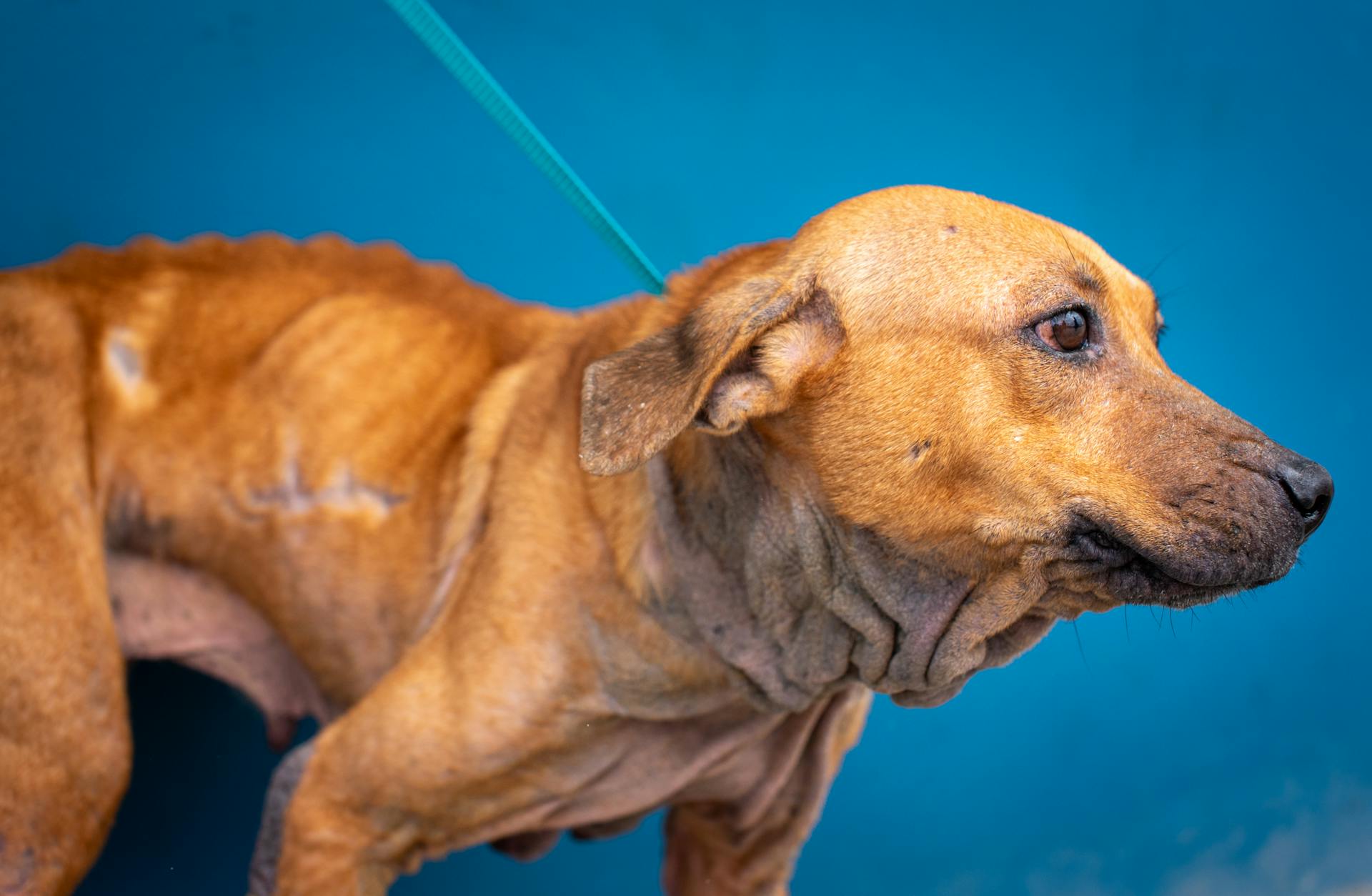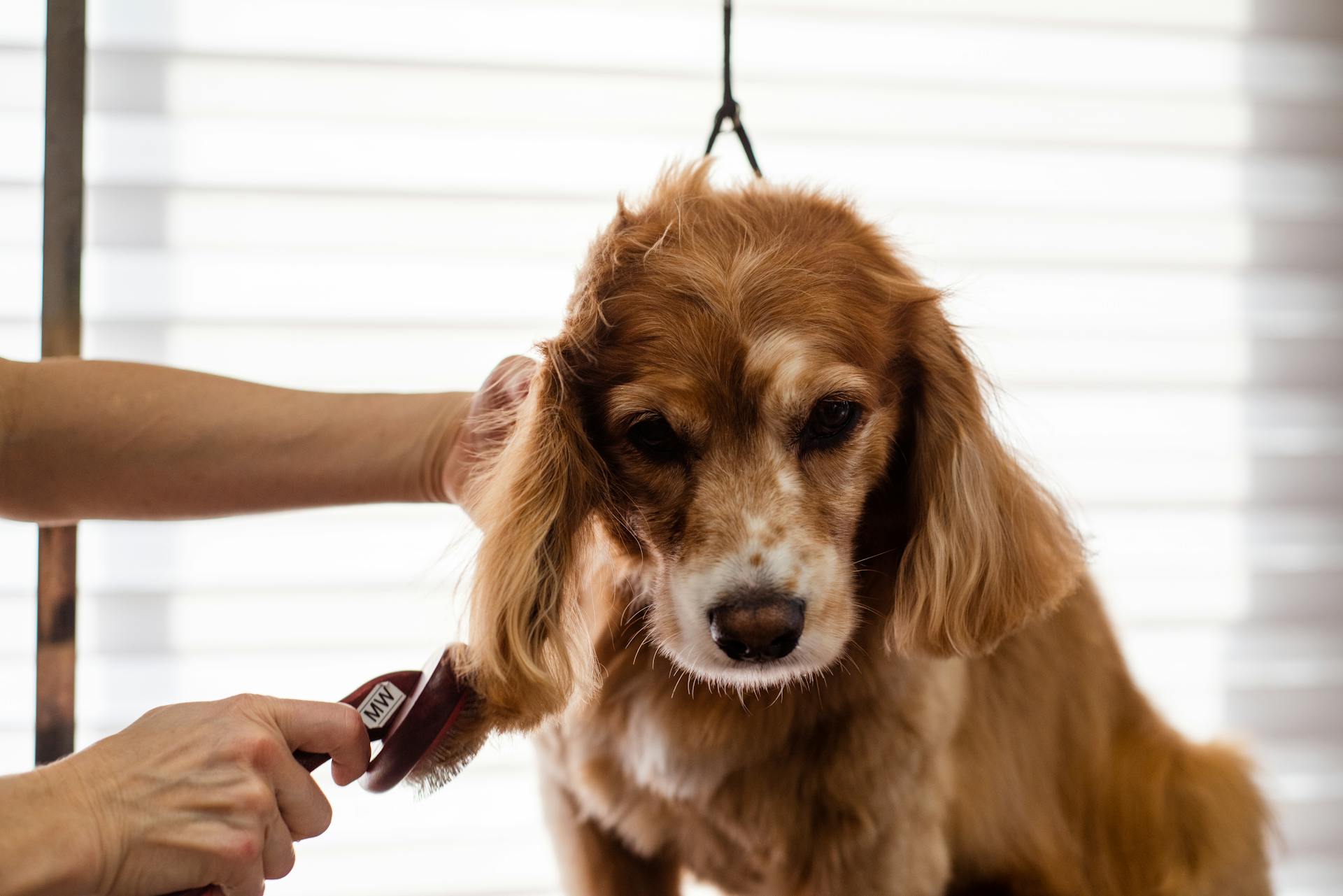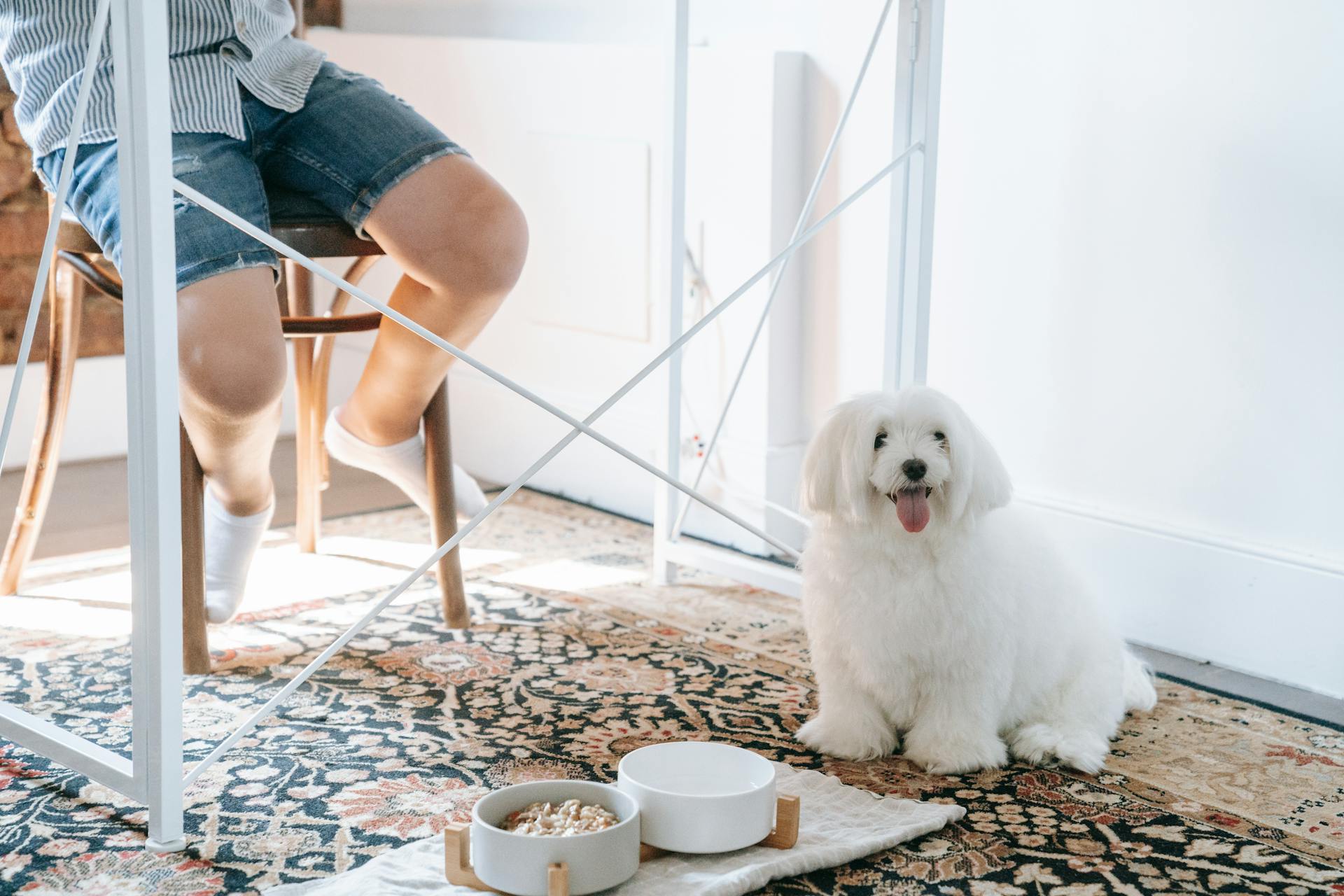
The Coton de Tulear is a small dog breed that originated on the island of Madagascar. It has a unique name that comes from the French and Malagasy languages.
These dogs are known for their soft, cotton-like coats, which require regular grooming to prevent matting and tangling. They have a gentle and affectionate nature, making them great companions for families with children.
The Coton de Tulear typically weighs between 8-15 pounds (3.5-6.8 kilograms) and stands about 10 inches tall at the shoulder. Their small size makes them perfect for apartment living or homes with limited space.
You might enjoy: 8 Week Old Yorkshire Terrier Puppy
Physical Characteristics
The Coton de Tulear is a small but sweet breed.
They have very soft and voluptuous hair, often described as feeling like a cotton ball. Their prominent black nose and large expressive eyes are also notable features.
Their legs may be somewhat short compared to their body, but they make up for it with their adorable curled tail that sits over their back.
Appearance
The Coton de Tuléar is a small dog with very soft and cottony hair that's often compared to a cotton ball. This unique coat texture earns it its name in French.
Its nose is typically black in color, but some registries allow for brown as an acceptable alternative. A pink or partly pink nose is not accepted by either standard. The lips should preferably be tight and the same color as the nose, which is usually black.
The Coton de Tuléar's eyes are normally round, dark in color, and wide-set. Traditionally, its expression is lively, intelligent, bright, and merry.
Here are some key physical characteristics of the Coton de Tuléar:
- Weight: 8-13 pounds
- Lifespan: 14-16 years
- Coat length: Medium-length, soft, and cottony
- Tail type: Curled over the back when in motion or excited
Its legs are somewhat short, but strong, with small and arched feet that have black pads. The body is of moderate length and has a moderate tuck-up. The loin is muscular and not overly long.
Size
The Coton de Tuléar is a small but mighty breed.
Males typically weigh between 6 to 8 kg (13 to 18 lb) and females between 3.5 to 5 kg (7.7 to 11.0 lb).
Their height varies, with males standing at 25 to 30 cm (9.8 to 11.8 in) tall and females at 22 to 27 cm (8.7 to 10.6 in).
The Coton's weight is also specified by the Coton de Tuléar Club of America as no more than 18 lb (8.2 kg), with an average of 11 to 15 lb (5.0 and 6.8 kg) for males.
Females are slightly shorter, standing at 8.5 to 11 inches and weighing 8 to 11 pounds.
Consider reading: 8 Week Old Boston Terrier
Coat Color and Grooming
The Coton de Tulear's coat is one of its most distinctive features - long, soft, and thick with a fluffy, cottony texture.
This breed is non-shedding, making it a great choice for people with allergies. It has low dander and is considered hypoallergenic, although puppies may shed their puppy coat. Matted hair is common in this breed due to its unique coat type.
The Coton de Tulear comes in three accepted colors: white (sometimes with tan markings), black and white, and tricolor. However, the colors can fade or change throughout puppyhood - for example, tan and white may become all white, while black may fade to grey or white.
You'll need to brush your Coton's coat regularly, ideally three or four times a week, using a pin brush with uncoated metal pins to prevent matted fur. Pay special attention to the areas behind the ears, legs, and elbows.
Using a spray conditioner as you brush will help minimize hair breakage, and brushing frequently can reduce the need for baths. A fine-toothed metal comb and a smaller comb for the face can also help keep your Coton looking sharp.
You may want to create a cute topknot using a coated hair elastic to show off your Coton's eyes, or consider keeping its coat in a short puppy clip for easier care. Depending on how dirty it gets, your Coton may need to be bathed weekly, every two weeks, or monthly.
When bathing your Coton, use a whitening shampoo to keep it looking its best, and pat it dry instead of rubbing with a towel to prevent knotting. Then, brush out the coat as you blow-dry to prevent tangles.
Your Coton's adult coat will start coming in between seven and 15 months of age, so be prepared for additional grooming needs during this time to prevent mats and tangles.
Related reading: Shiba Inu to 1 Cent
Personality And Temperament
The Coton de Tulear is a people-pleaser who wants nothing more than to spend time with his humans.
They're known for forming strong bonds with family members and don't like to be separated from them. This can sometimes lead to separation anxiety, so it's essential to socialize your Coton puppy early on. Early exposure to different people, sights, sounds, and experiences helps ensure your Coton grows into a well-adjusted, happy dog.
Cotons are intelligent dogs who respond well to praise, play, and food rewards. They're easy to train and will even learn tricks like walking on their hind legs. This trait makes them great companions for families with small children, as they can entertain both kids and adults alike.
In the evening, Cotons tend to come alive, and you might find yourself playing fetch or tug-o-war with your energetic pup. They love to play and will happily join in on any activity that involves their favorite humans. While they're not exactly watchdogs, Cotons will bark if someone comes to the door or passes by, serving as a gentle warning.
A unique perspective: Will Shiba Inu Coin Reach $1
Despite their playful nature, Cotons are peaceful pups who prefer to cuddle rather than cause trouble. They'll often sleep on the floor nearby if you can't cuddle with them, but they always appreciate a good snuggle session. With proper socialization and training, your Coton de Tulear will be a loving and loyal companion for years to come.
Care and Feeding
The Coton de Tulear is a relatively low-maintenance breed when it comes to grooming. They require brushing and combing almost daily and bathing about once per week to maintain their beauty.
Their unique coat texture causes shed hair to be trapped within it, so regular brushing is essential to prevent matting. Daily walks are also necessary for exercise, but they'll appreciate play sessions as often as possible and have the endurance to go on a long hike. They're great with kids and love playing with other dogs.
In terms of feeding, the recommended daily amount for an adult Coton de Tulear is 3/4 cup of high-quality dog food divided into two meals. It's essential to monitor their weight and adjust their diet accordingly, making sure they have a visible waist and can feel but not see their ribs without pressing hard.
Weight
When assessing your Coton de Tulear's weight, there are a few things to keep in mind. You should be able to see a waist when looking down at your dog.
To determine if your Coton is overweight, place your hands on his back with your thumbs along the spine and fingers spread downward. If you can feel but not see his ribs without pressing hard, he needs less food and more exercise.
A highly active Coton de Tulear will need more food than a couch potato dog, so consider their activity level when deciding how much to feed them. The quality of dog food also makes a difference - better food goes further in nourishing your dog.
Here are some factors that affect the amount of food your Coton needs:
- The type and brand of dog food
- Your dog’s health history
- Your dog’s age
- Your dog’s current and desired weight
Lifetime Care
The Coton requires a daily brushing and combing routine to maintain its beautiful coat.
Its fur texture causes shed hair to be trapped in the coat, so regular grooming is essential to prevent matting and potential shaving needs.
Daily walks are a must for this breed's exercise needs, but they'll also appreciate play sessions as often as possible.
A long hike or two wouldn't go amiss either, given their endurance levels.
Feeding
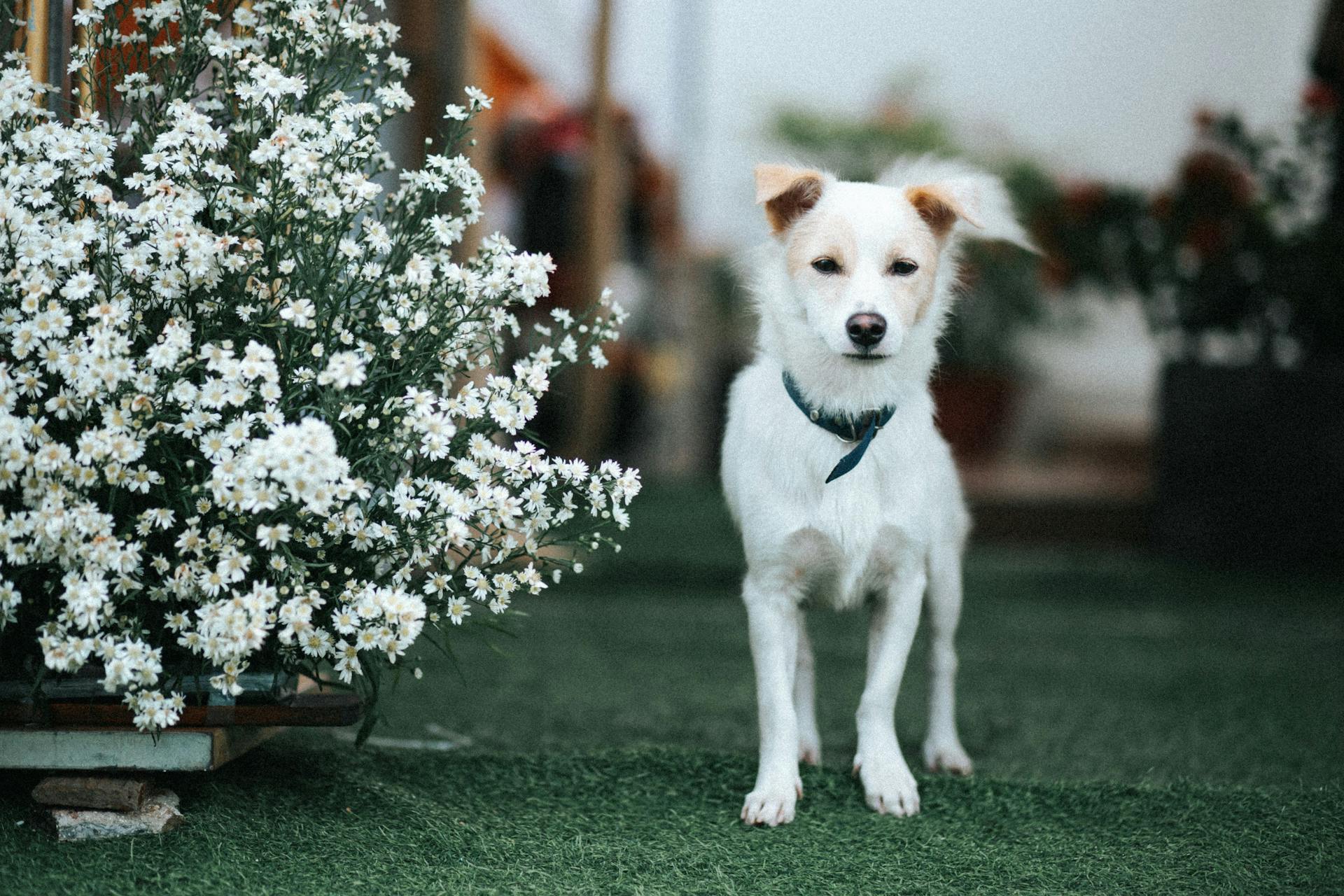
Feeding your Coton de Tulear is an essential part of their care and well-being.
The recommended daily amount for an adult Coton de Tulear is 3/4 cup of high-quality dog food, divided into two meals. This amount can vary depending on size, age, build, metabolism, and activity level, so it's crucial to monitor your furry friend's waistline and ribcage.
A highly active Coton will need more food than a less active one, while the quality of dog food you buy also makes a difference in how much your dog needs. To ensure your Coton is getting the right amount, consider measuring their food and feeding them twice a day rather than leaving it out all the time.
Cotons do best on high-quality dry or wet foods approved by the Association of American Feed Control Officials (AAFCO), with a protein content of about 30% to keep them healthy. You can also mix both types for added nutrition.
As your Coton grows, their feeding schedule will change - puppies need three or four meals a day on a regular schedule, while adult Cotons generally eat twice a day in the morning and evening.
Take a look at this: Boston Terrier Day
Fun Activities
Engage your Coton de Tulear in agility training to keep them physically and mentally stimulated.
Agility training is a great way to challenge your dog's body and mind. It involves setting up an obstacle course that your Coton de Tulear can run through, jumping over hurdles, weaving through tunnels, and other fun activities. This type of exercise will help improve their coordination, balance, and overall physical fitness.
Swimming is another excellent activity for Cotons de Tulear. Not only does it provide a great workout, but it's also low-impact, making it perfect for dogs with joint issues or those who are recovering from an injury.
Fetch is a simple yet entertaining game that your Coton de Tulear will love. Grab a ball or toy and toss it across the room or yard, encouraging your dog to retrieve it. This activity will help improve their retrieval skills and get them some much-needed exercise.
You might enjoy: Pembroke Welsh Corgi Agility
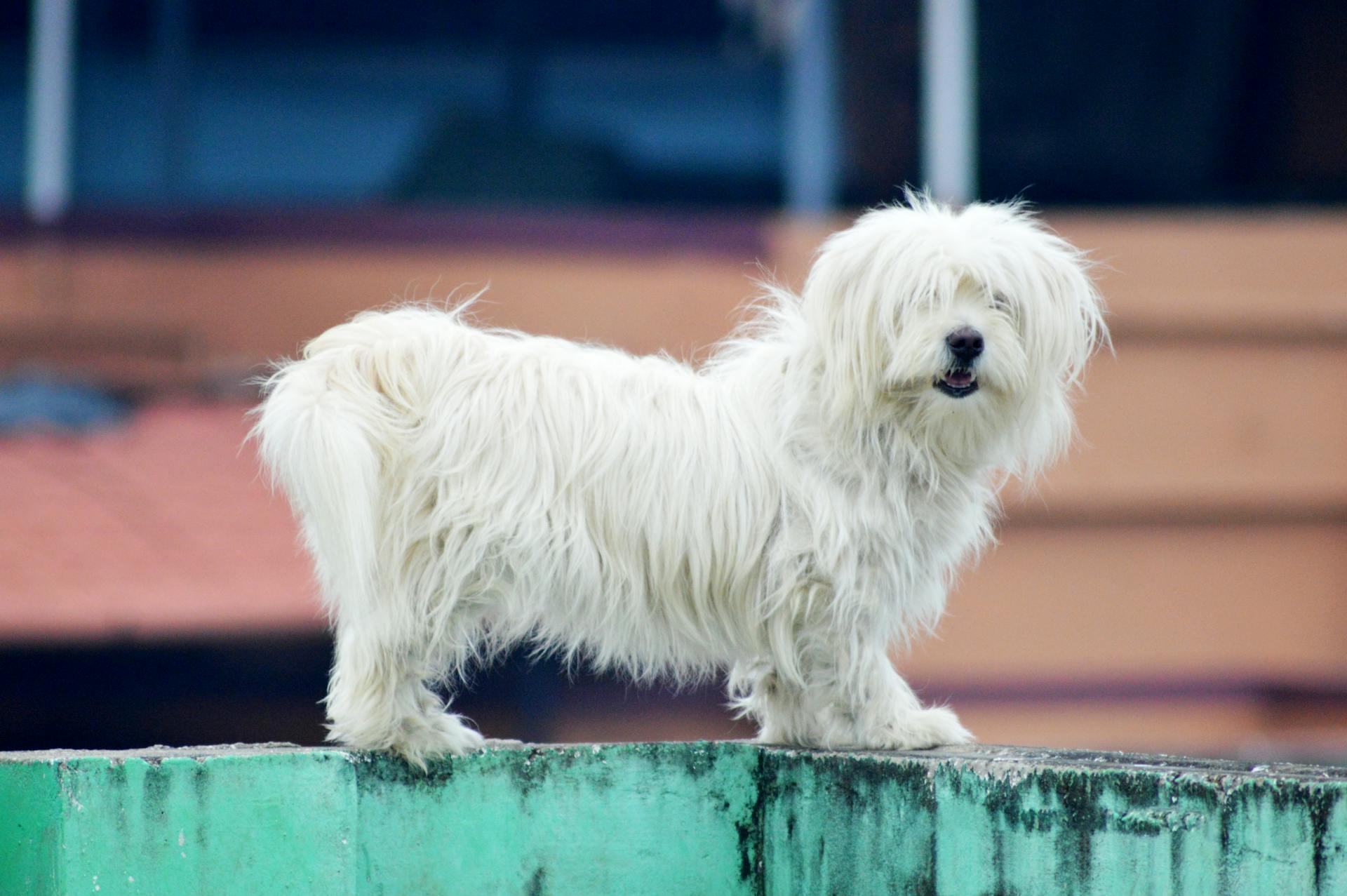
In addition to these activities, obedience training is essential for any dog, including Cotons de Tulear. It will help you establish a strong bond with your dog while teaching them basic commands like "sit", "stay", and "come."
Cuddling with their pet parents is one of the favorite things about being a Coton de Tulear! They love to snuggle up close and receive affection from their family members.
Here are some fun activities for your Coton de Tulear:
- Agility
- Swimming
- Fetch
- Obedience training
- Cuddling with their pet parents
Health and Wellness
The Coton de Tulear is generally a healthy breed, but like all breeds, they can be prone to certain health issues.
A 2024 UK study found that this breed has a life expectancy of around 14-15 years, which is impressive considering the average lifespan for purebred dogs. Some studies suggest that Coton de Tulears may live even longer, with lifespans ranging from 15-19 years.
Some common health issues in Cotons include luxating patellas, hip dysplasia, and progressive retinal atrophy (PRA). These conditions can be inherited or caused by environmental factors such as rapid growth or injuries. Reputable breeders will often provide health certifications for a puppy's parents to ensure they are not breeding dogs with these issues.
Worth a look: Bull Terrier Then and Now
Here are some common health issues in Cotons:
- Luxating patellas: A condition where the knees slip out of place
- Hip dysplasia: A heritable condition that affects the hip joint
- Progressive retinal atrophy (PRA): A degenerative eye disorder that can lead to blindness
It's worth noting that many health issues in Cotons don't appear until a dog is fully mature, so it's often recommended that dogs not be bred until they are two or three years old.
Health Issues
Cotons are generally healthy dogs, but like any breed, they can be prone to certain health issues.
One common problem in small breeds like Cotons is Luxating Patellas, where the kneecap slips out of place. Symptoms include sudden lifting of a hind leg, a hunched position, bunny hopping, and/or popping noises when the knee bends.
Mild cases of patellar luxation can be treated with rest, anti-inflammatory medication, and weight loss. More severe cases may require surgery.
Hip Dysplasia is another condition that can affect Cotons, where the thighbone doesn't fit snugly into the hip joint. This can cause pain and lameness in one or both rear legs, and arthritis can develop as the dog ages.
Curious to learn more? Check out: One Eyed Shih Tzu
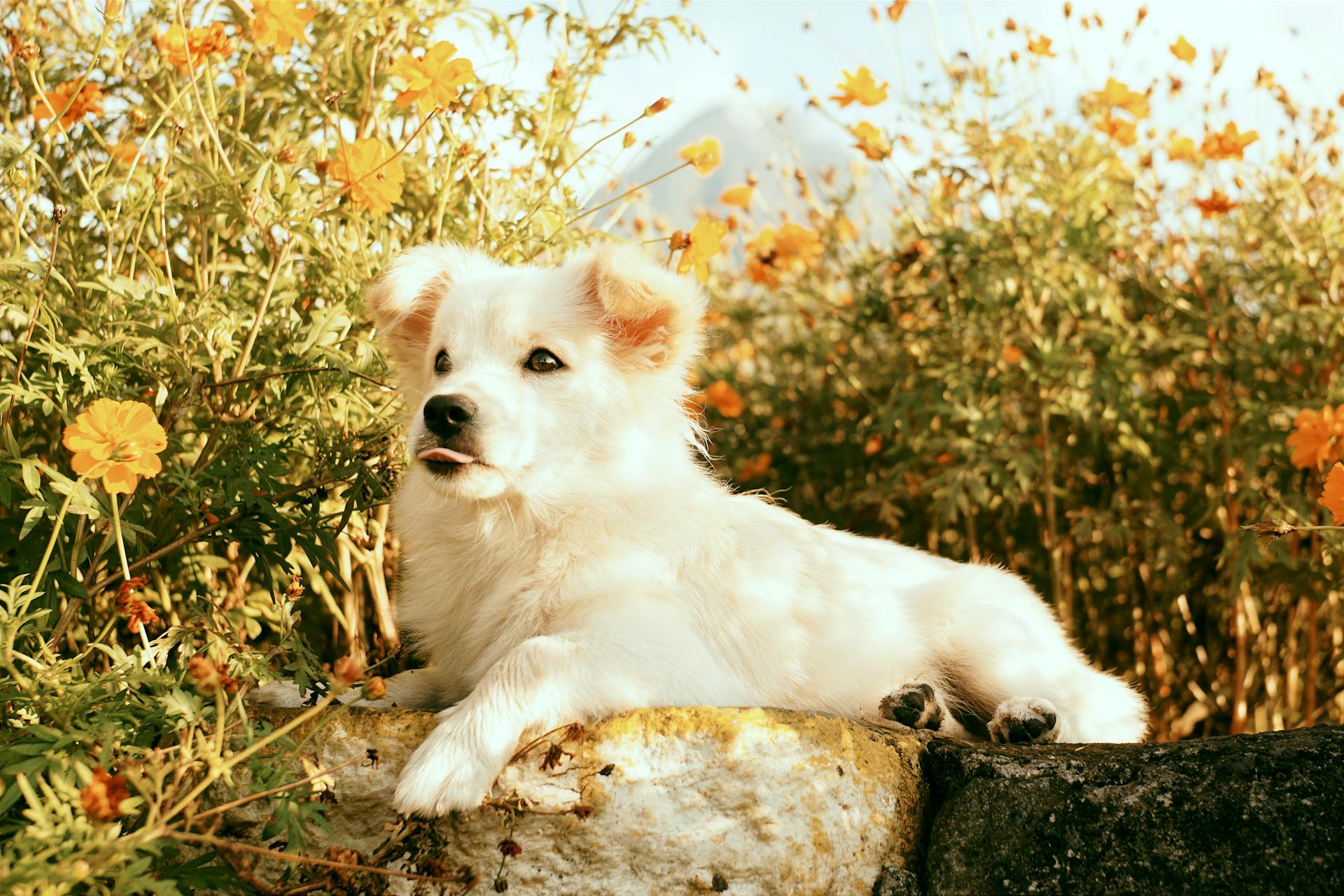
Progressive Retinal Atrophy (PRA) is a hereditary degenerative eye disorder that eventually causes blindness from the loss of photoreceptors at the back of the eye. Fortunately, dogs can use their other senses to compensate for blindness, and a blind dog can live a full and happy life.
Reputable breeders provide health certifications for a puppy's parents, including OFA certification for knees, hips, elbows, and hearts, as well as certification of eye health from the Canine Eye Registry Foundation. Some breeders may also provide OFA thyroid certifications.
Here are some common health issues in Cotons:
- Luxating Patellas: sudden lifting of a hind leg, hunched position, bunny hopping, popping noises when knee bends
- Hip Dysplasia: pain and lameness in one or both rear legs, arthritis as dog ages
- Progressive Retinal Atrophy (PRA): blindness from loss of photoreceptors at back of eye
It's essential to work with a reputable breeder who has had their dogs' health certified. They can provide you with information on the health testing that has been done and can help you make an informed decision when choosing a puppy.
Staying Fit and Healthy
The Coton de Tulear is a relatively healthy breed, but like all dogs, they can benefit from regular exercise and proper care.
A 2024 UK study found that this breed has a life expectancy of 14.2 years, so it's essential to prioritize their health and wellness.
To keep your Coton fit and active, take them on long walks - they'll love joining you! Their shorter legs mean they may tire more easily, so go slowly and enjoy the stroll together.
Play games with your Coton, like fetch, to mentally stimulate them. This will also provide physical exercise and help prevent boredom.
Protecting their joints is crucial, especially during puppyhood. Make sure to keep an eye on them when they're jumping on and off furniture, as this can lead to luxating patellas - a common problem in small breeds.
Hip dysplasia is another condition that affects some Cotons, so it's essential to have your dog's hips checked by the Orthopedic Foundation for Animals or the University of Pennsylvania Hip Improvement Program (PennHIP).
You should also keep an eye out for signs of Progressive Retinal Atrophy (PRA), a hereditary degenerative eye disorder. Reputable breeders will have their dogs' eyes certified annually by a veterinary ophthalmologist.
Regular exercise, proper care, and regular health checks can go a long way in keeping your Coton happy and healthy.
Discover more: Hip Dysplasia Bernese Mountain Dog
Allergy-Friendly Breed
The Coton de Tuléar is a good option for dog owners with allergies.
This breed has no undercoat and can be considered allergy-friendly because it sheds and flakes very little.
However, individual dogs may vary, so you can't be 100% certain of not having an allergic reaction.
History and Origin
The Coton de Tulear has a rich and fascinating history that spans centuries. It originated on the island nation of Madagascar, located off the southeast coast of Africa in the Indian Ocean.
Some theories suggest that the breed accompanied ladies on long sea voyages or were used as ratters on ships, while others claim they were shipwreck survivors who established themselves on the island. Whatever the case may be, it's clear that the Coton de Tulear has a unique and storied past.
The breed was first brought to France in the 1970s by a Frenchman visiting Madagascar, where it quickly gained popularity as a companion dog. Today, the Coton de Tulear is registered with various kennel clubs around the world, including the United Kennel Club and Europe's Federation Cynologique Internationale (FCI).
Explore further: American Kennel Club Lancashire Heeler
The History of
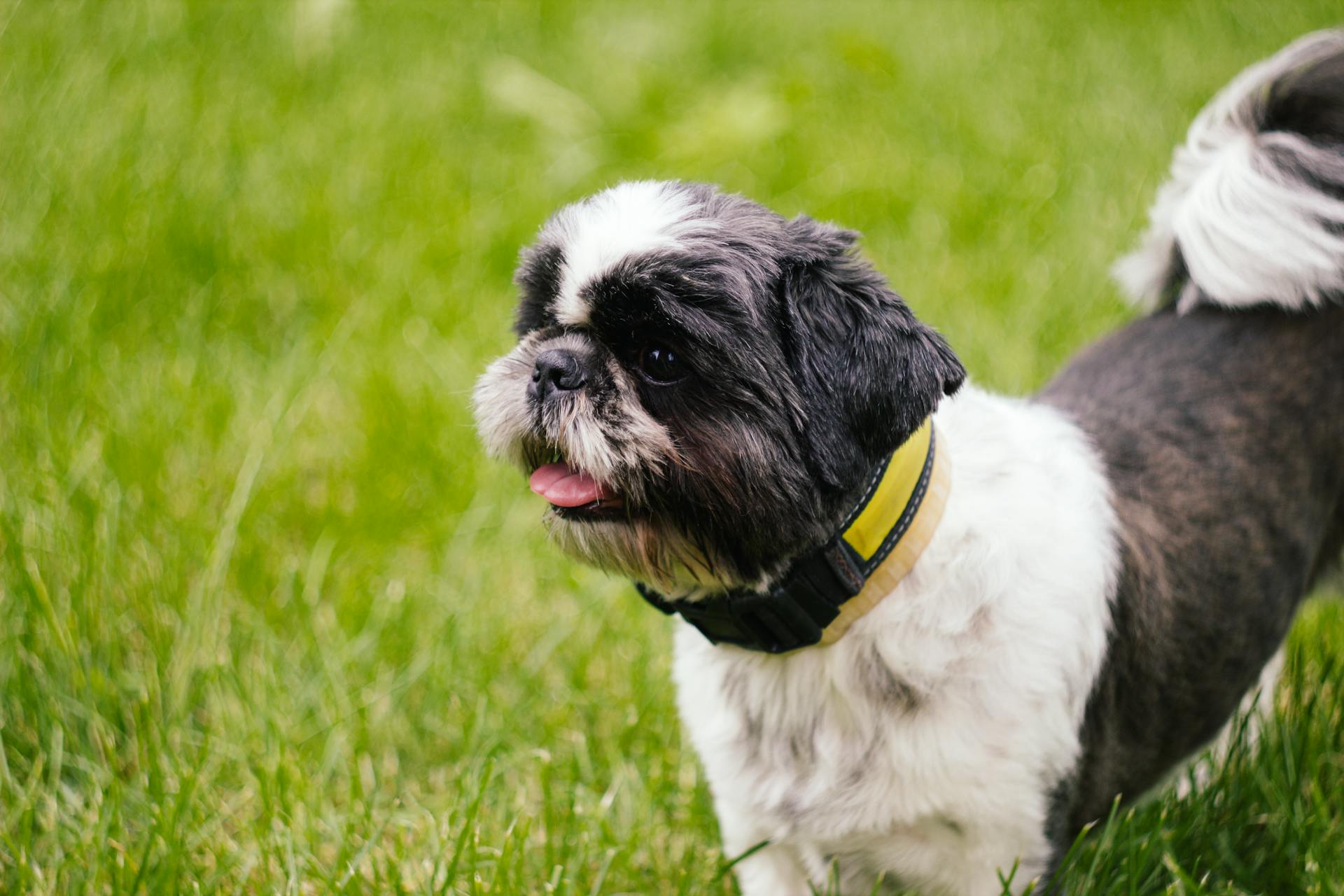
The History of the Coton de Tulear is a fascinating tale that spans centuries and continents.
It's said to have originated on the island of Madagascar, where it was likely brought by European sailors who used them as ratters on ships or as companions for ladies on long sea voyages.
Some theories suggest that the dogs were beached in Madagascar after being shipwrecked survivors. Whatever the exact origin story may be, one thing is certain: the Coton de Tulear has a rich and storied history that's deeply connected to its island home.
The breed was first established as a distinct entity in the 1970s by a Frenchman who brought some Cotons back from Madagascar and worked to develop them into a recognized breed.
Today, the Coton de Tulear is found not only on its native island but also in many parts of the world, including North America, where it's registered with several kennel clubs.
For another approach, see: South Korean Jindo Island
A Lasting Legacy
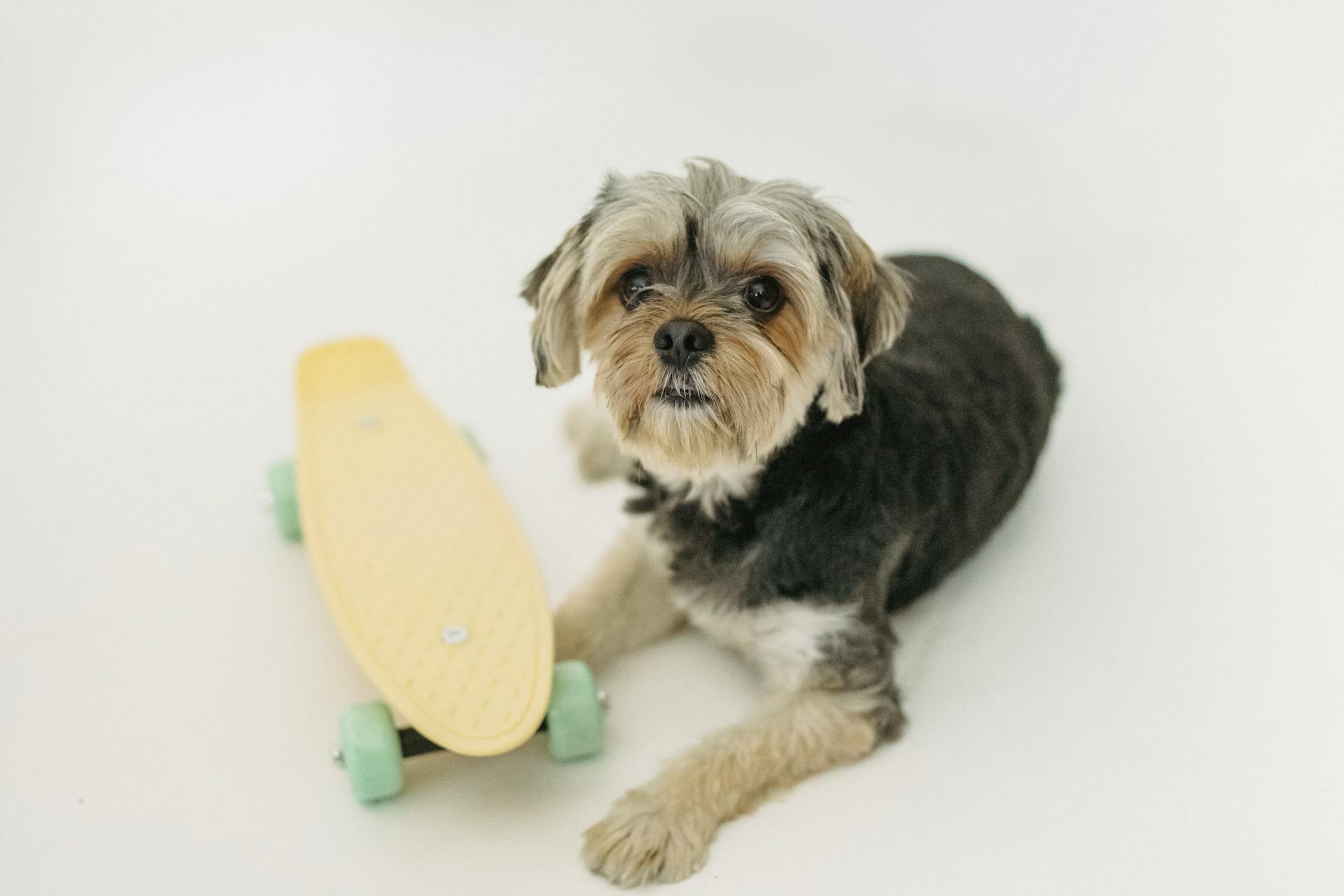
The Coton de Tuléar is a true family dog that thrives on social contact and attention from its pack.
It requires a lot of interaction to thrive, so it's essential to give this breed plenty of love and care. A companion that will stick with you like velcro, the Coton de Tuléar is perfect for families who want a loyal friend by their side.
This sociable dog gets along well with children and can even play and romp around with them despite its small size.
Frequently Asked Questions
What are the disadvantages of a Coton de Tulear?
Coton de Tulears may be prone to certain health issues, including luxating patella, hip dysplasia, liver shunt, disc problems, and eye concerns. Regular veterinary check-ups are essential for these dogs to ensure prompt treatment of any potential conditions.
How much should a Coton de Tulear cost?
A Coton de Tulear puppy from a reputable breeder typically costs between $1,400 to $3,000. Prices may be higher for award-winning or show-quality Cotons.
Do Coton de Tulear dogs bark a lot?
Coton de Tulear dogs are known to bark relatively often, but with proper training, this behavior can be managed. Proper training is key to minimizing excessive barking in this breed.
Why are Coton de Tulears so expensive?
Coton de Tulears are rare dogs, making them expensive due to their limited availability. Their high price is a result of responsible breeding efforts that help prevent extinction.
How much does Coton de Tulear cost?
A Coton de Tulear puppy from a reputable breeder costs around $1,400 to $3,000. Prices may be higher for show-quality or award-winning Cotons.
Featured Images: pexels.com
